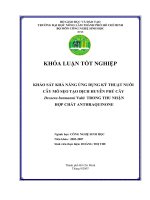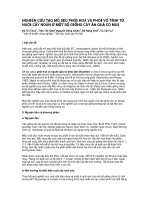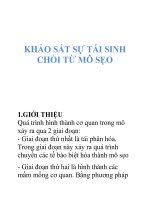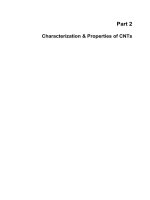SEO improvements ppsx
Bạn đang xem bản rút gọn của tài liệu. Xem và tải ngay bản đầy đủ của tài liệu tại đây (65.51 KB, 7 trang )
NPR #36 – 20101108
Search Engine Optimization
(SEO) Related issues
By
Øyvind Michaelsen Nov 8th 2010
Limit indexing of search result pages with many parameters DONE
•
Background: Google Webmaster Tools complains about too many
indexed pages
•
This might affect overall importance given to our site / search rankings
•
Solution: Do not index any search result page with more than 2
parameters in query string
•
Implentation: If more than 2 parameters in query string, add this to html
header:
•
<html> <head> <title> </title> <META NAME="ROBOTS"
CONTENT="NOINDEX, FOLLOW"> </head>
•
Note that we want the page to be followed
•
Since this is so fragile, please implement on test server first
”OR” searches when no results
In DOING
•
When a query gives no results, change the query to be OR
instead of AND
•
Message to user: ”Vi fant ingen resultater på søket ’xx OG
yy'. Resultatet viser derfor xx ELLER yy’”
•
English: ”No results found for the query ’xx AND yy’.
Results are shown for query ’xx OR yy’”
•
Should work for any number of search parameters
Listing old jobs (no longer published)
In DOING
•
We can gain a lot of relevant traffic from search engines if we improve
linking to old jobs
•
Even if candidates visit an old job, they might find other relevant,
newer jobs in the same company
•
Today, old jobs disappear from search engines since they are no
longer linked to internally at KarriereStart.no
•
Solution: Create a page similar to the search result page, but only with
jobs that have end publish date < today
•
Link to this page from footer, with anchor text ”Arkiv” (archive)
XML Sitemap DOING VIDEO SITEMAP
•
Create an xml sitemap according to
/>•
All public pages (not logged in) should be included
•
The sitemap file helps the search bots find pages that have
been ignored or may not normally get crawled
•
The sitemap.xml file is used by the bots from Google,
Yahoo, Microsoft Live Search and Ask.com
Sitemap 0.90
<urlset>required Encapsulates the file and references the current protocol standard.
<url>required Parent tag for each URL entry. The remaining tags are children of this tag.
<loc>required URL of the page. This URL must begin with the protocol (such as http) and end with a trailing slash, if your web server requires it. This value must be less than 2,048
characters.
<lastmod>optional The date of last modification of the file. This date should be in W3C Datetime format. This format allows you to omit the time portion, if desired, and use YYYY-MM-DD.
Note that this tag is separate from the If-Modified-Since (304) header the server can return, and search engines may use the information from both sources differently.
<changefreq>optional How frequently the page is likely to change. This value provides general information to search engines and may not correlate exactly to how often they crawl the
page. Valid values are:
always
hourly
daily
weekly
monthly
yearly
never
The value "always" should be used to describe documents that change each time they are accessed. The value "never" should be used to describe archived URLs.
Please note that the value of this tag is considered a hint and not a command. Even though search engine crawlers may consider this information when making decisions, they may crawl
pages marked "hourly" less frequently than that, and they may crawl pages marked "yearly" more frequently than that. Crawlers may periodically crawl pages marked "never" so that they
can handle unexpected changes to those pages.
<priority>optional The priority of this URL relative to other URLs on your site. Valid values range from 0.0 to 1.0. This value does not affect how your pages are compared to pages on other
sites—it only lets the search engines know which pages you deem most important for the crawlers.
The default priority of a page is 0.5.
Please note that the priority you assign to a page is not likely to influence the position of your URLs in a search engine's result pages. Search engines may use this information when selecting
between URLs on the same site, so you can use this tag to increase the likelihood that your most important pages are present in a search index.
Also, please note that assigning a high priority to all of the URLs on your site is not likely to help you. Since the priority is relative, it is only used to select between URLs on your site.
Sitemap details
•
LastMod: Set on jobs and companies
•
ChangeFreq: Ignore
•
Priority: 1.0 for company profiles and jobs, not
specified for any other pages









